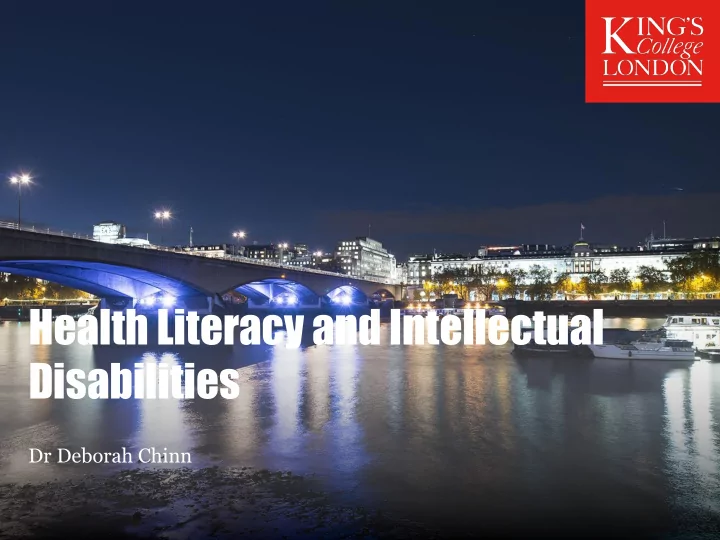

Health Literacy and Intellectual Disabilities Dr Deborah Chinn
Introduction Themes for the panel • What are health literacy challenges faced by people with intellectual disabilities? • Approaches to enhancing health literacy for people with ID • What can work in health literacy offer people with ID? • What can mainstream health literacy research/practice learn from work with people with ID?
Health inequalities and learning disabilities Compared to others, people with Health services are failing learning disabilities have worse people with learning disabilities health They die younger (CIPOLD 2013) Service deficiencies in communication and sharing 90 information 80 70 60 50 Men 40 Women 30 20 10 0 LD Non LD
Health literacy as asset not deficit - outcome of health promotion approaches (Nutbeam 2000) Functional health literacy Being able to make sense of information needed to follow advice of health staff: reading, numeracy, background health knowledge. Traditional “health education” model – patient compliance Communicative/Interactive Health Literacy Skills needed to communicate with others about health and seek information. Self-management model Critical Health Literacy Critical appraisal of health information, appreciation of social determinants of health. Self-determination, emancipatory model
ID and Functional Health Literacy Rights-based context Equality legislation (AIS 2015) Reasonable adjustments Total communication Involvement of SALTs Range of formats (photos, symbols, pictures) Autonomy and empowerment Promoting independence People with ID actively involved in creating materials (Change 2014)
How effective in promoting health literacy? • Guidance for use not included • No standard definition or quality benchmark • Not always evident adjustments make information easier to understand • Very hard to evaluate uptake or impact • Who is the “imagined user”?
Insights from ID-focused research/practice relating to functional health literacy • Involvement of consumers in creating adapted materials • Search for “a standard” • Emphasis on personalisation of materials • Creative use of media Talking websites Talking Mats Books Beyond Words
Interactive/Communicative health literacy • Reports of poor communicative practices of health workers (though no interactional data) eg Ziviani 2004 • Handful of studies focusing on supporting people with ID to improve health communication (Chinn 2015) • Successful in teaching skills and knowledge though not evaluated in situ
Insights from ID-focused research/practice on health communication training • Effectiveness of using range of learning approaches and communication aids • Use of health records • Role of carers/supporters; help and hindrance • Importance of considering emotional factors impacting on communicative health literacy
Critical health literacy and ID • Almost no research in this area (Chinn, 2014). One example involving people with ID in responding to genetic testing in pregnancy (Ward 2002) • Assumptions that people with ID not capable of critical analysis of their own lives. • Increasing concern with health inequalities and structural disadvantage experienced by people with ID – involvement of people with ID in health activism.
Insights from ID-focused research relating to critical health literacy • Revise ideas of “literacy” • New Literacy Studies approach - Set of social practices rather than set of autonomous skills • Literacy practices shared with literacy mediators • Need more information about everyday home literacy practices of “illiterate” including practices of critique • What is meaning of critical agency outside language proficiency?
Introduction to the panel presentations Questions to consider: • How might I use approaches described in my own health literacy promotion practices? • How can I make sure that people with ID are included in my health literacy promotion practices?
Recommend
More recommend